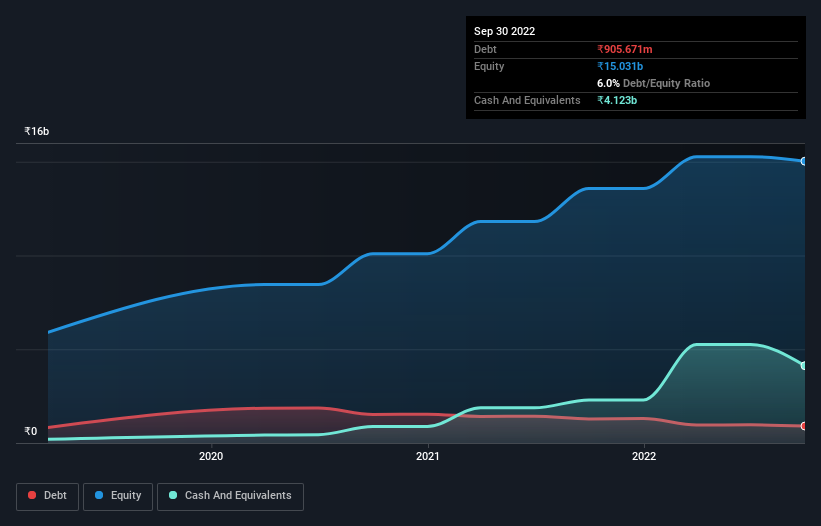These 4 Measures Indicate That Suven Pharmaceuticals (NSE:SUVENPHAR) Is Using Debt Safely

Howard Marks put it nicely when he said that, rather than worrying about share price volatility, 'The possibility of permanent loss is the risk I worry about... and every practical investor I know worries about.' When we think about how risky a company is, we always like to look at its use of debt, since debt overload can lead to ruin. We note that Suven Pharmaceuticals Limited (NSE:SUVENPHAR) does have debt on its balance sheet. But is this debt a concern to shareholders?
Why Does Debt Bring Risk?
Debt assists a business until the business has trouble paying it off, either with new capital or with free cash flow. Ultimately, if the company can't fulfill its legal obligations to repay debt, shareholders could walk away with nothing. However, a more common (but still painful) scenario is that it has to raise new equity capital at a low price, thus permanently diluting shareholders. By replacing dilution, though, debt can be an extremely good tool for businesses that need capital to invest in growth at high rates of return. When we examine debt levels, we first consider both cash and debt levels, together.
See our latest analysis for Suven Pharmaceuticals
What Is Suven Pharmaceuticals's Net Debt?
The image below, which you can click on for greater detail, shows that Suven Pharmaceuticals had debt of ₹905.7m at the end of September 2022, a reduction from ₹1.29b over a year. But on the other hand it also has ₹4.12b in cash, leading to a ₹3.22b net cash position.

How Strong Is Suven Pharmaceuticals' Balance Sheet?
Zooming in on the latest balance sheet data, we can see that Suven Pharmaceuticals had liabilities of ₹2.16b due within 12 months and liabilities of ₹864.7m due beyond that. On the other hand, it had cash of ₹4.12b and ₹1.11b worth of receivables due within a year. So it actually has ₹2.21b more liquid assets than total liabilities.
This state of affairs indicates that Suven Pharmaceuticals' balance sheet looks quite solid, as its total liabilities are just about equal to its liquid assets. So it's very unlikely that the ₹121.9b company is short on cash, but still worth keeping an eye on the balance sheet. Succinctly put, Suven Pharmaceuticals boasts net cash, so it's fair to say it does not have a heavy debt load!
Also positive, Suven Pharmaceuticals grew its EBIT by 27% in the last year, and that should make it easier to pay down debt, going forward. The balance sheet is clearly the area to focus on when you are analysing debt. But it is future earnings, more than anything, that will determine Suven Pharmaceuticals's ability to maintain a healthy balance sheet going forward. So if you're focused on the future you can check out this free report showing analyst profit forecasts.
Finally, a business needs free cash flow to pay off debt; accounting profits just don't cut it. Suven Pharmaceuticals may have net cash on the balance sheet, but it is still interesting to look at how well the business converts its earnings before interest and tax (EBIT) to free cash flow, because that will influence both its need for, and its capacity to manage debt. Over the most recent three years, Suven Pharmaceuticals recorded free cash flow worth 57% of its EBIT, which is around normal, given free cash flow excludes interest and tax. This cold hard cash means it can reduce its debt when it wants to.
Summing Up
While it is always sensible to investigate a company's debt, in this case Suven Pharmaceuticals has ₹3.22b in net cash and a decent-looking balance sheet. And we liked the look of last year's 27% year-on-year EBIT growth. So we don't think Suven Pharmaceuticals's use of debt is risky. The balance sheet is clearly the area to focus on when you are analysing debt. But ultimately, every company can contain risks that exist outside of the balance sheet. These risks can be hard to spot. Every company has them, and we've spotted 1 warning sign for Suven Pharmaceuticals you should know about.
At the end of the day, it's often better to focus on companies that are free from net debt. You can access our special list of such companies (all with a track record of profit growth). It's free.
If you're looking to trade Cohance Lifesciences, open an account with the lowest-cost platform trusted by professionals, Interactive Brokers.
With clients in over 200 countries and territories, and access to 160 markets, IBKR lets you trade stocks, options, futures, forex, bonds and funds from a single integrated account.
Enjoy no hidden fees, no account minimums, and FX conversion rates as low as 0.03%, far better than what most brokers offer.
Sponsored ContentNew: AI Stock Screener & Alerts
Our new AI Stock Screener scans the market every day to uncover opportunities.
• Dividend Powerhouses (3%+ Yield)
• Undervalued Small Caps with Insider Buying
• High growth Tech and AI Companies
Or build your own from over 50 metrics.
Have feedback on this article? Concerned about the content? Get in touch with us directly. Alternatively, email editorial-team (at) simplywallst.com.
This article by Simply Wall St is general in nature. We provide commentary based on historical data and analyst forecasts only using an unbiased methodology and our articles are not intended to be financial advice. It does not constitute a recommendation to buy or sell any stock, and does not take account of your objectives, or your financial situation. We aim to bring you long-term focused analysis driven by fundamental data. Note that our analysis may not factor in the latest price-sensitive company announcements or qualitative material. Simply Wall St has no position in any stocks mentioned.
About NSEI:COHANCE
Cohance Lifesciences
Cohance Lifesciences Limited engage in the end-to-end contract development and manufacturing of intermediates and active pharmaceutical ingredients in India.
Flawless balance sheet with high growth potential.
Similar Companies
Market Insights
Community Narratives




